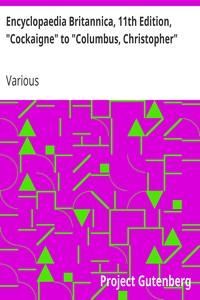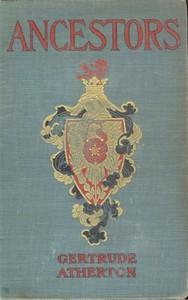Read this ebook for free! No credit card needed, absolutely nothing to pay.
Words: 153330 in 18 pages
This is an ebook sharing website. You can read the uploaded ebooks for free here. No credit cards needed, nothing to pay. If you want to own a digital copy of the ebook, or want to read offline with your favorite ebook-reader, then you can choose to buy and download the ebook.


: Encyclopaedia Britannica 11th Edition Cockaigne to Columbus Christopher Volume 6 Slice 6 by Various - Encyclopedias and dictionaries
aperture. In the Teleostomi abdominal pores are rare, but in most Teleostei the ova pass directly down oviducts, as they do in Arthropods, without entering the peritoneal cavity; there is little doubt, however, that these oviducts are originally coelomic in origin. In the Dipnoi abdominal pores are found, and probably serve as a passage for the sperm cells, since there are no vasa deferentia. In fishes a complete dorsal mesentery is seldom found in the adult; in many cases it only remains as a tube surrounding the vessels passing to the alimentary canal.
In the Amphibia, Reptilia and Aves, one cavity acts as pleura and peritoneum, though in the latter the lungs are not completely surrounded by a serous membrane. In many lizards the comparatively straight intestine, with its continuous dorsal mesentery and ventral mesentery in the anterior part of the abdomen, is very like a stage in the development of the human and other mammalian embryos. In the mammalia the diaphragm is complete and divides the pleuro-peritoneal cavity into its two constituent parts. In the lower mammals the derivatives of the original dorsal mesentery do not undergo as much fusion and obliteration as they do in adult man; the ascending and descending mesocolon is retained, and the transverse mesocolon contracts no adhesion to the great omentum. It is a common thing, however, to find a fenestrated arrangement of the great omentum which shows that its layers have been completely obliterated in many places.
In those animals, such as the rabbit, in which the tests are sometimes in the scrotum and sometimes in the abdomen, the communication between the peritoneum and the tunica vaginalis remains throughout life.
FOOTNOTE:
Some authorities hold that this alteration is not brought about by fusion, but by a dragging away of the posterior layer of the great omentum from the dorsal wall of the abdomen.
COEN, JAN PIETERSZOON , fourth governor-general of the Dutch East Indies, was born at Hoorn, and spent his youth at Rome in the house of the famous merchants the Piscatori. In 1607 he sailed from Amsterdam to the Indies as second commercial agent, and remained away four years. He had proved so capable that in 1612 he was sent out a second time at the head of a trading expedition. In the following year he was made a councillor and director-general of the East Indian trade. Afterwards he became president at Bantam, and on the 31st of October 1617 he was promoted in succession to Laurens Reaal to the post of governor-general. To his vigour and intrepidity the Dutch in no small measure owed the preservation and establishment of their empire in the East. He took and destroyed Jacatra, and founded on its ruins the capital of the Dutch East Indies, to which he gave the name of Batavia. In 1622 Coen obtained leave to resign his post and return to Holland, but in his absence great difficulties had arisen with the English at Amboina , and in 1627 under pressure from the directors of the East India Company he again returned as governor-general to Batavia. In 1629 he was able to beat off a formidable attack of the sultan of Mataram, sometimes styled emperor of Java, upon Batavia. He died the following year.
COENACULUM, the term applied to the eating-room of a Roman house in which the supper or latest meal was taken. It was sometimes placed in an upper storey and reached by an external staircase. The Last Supper in the New Testament was taken in the Coenaculum, the "large upper room" cited in St Mark and St Luke .
The term "coercion" is inevitably somewhat ambiguous, and depends on the circumstances of the case. In a political sense, the application of the Crimes Act of 1887 to Ireland was called "coercion" by those opposed to the English Unionist party and government, as being special legislation differing from the ordinary law applicable in the United Kingdom.
COEUR, JACQUES , founder of the trade between France and the Levant, was born at Bourges, in which city his father, Pierre Coeur, was a rich merchant. Jacques is first heard of about 1418, when he married Mac?e de L?odepart, daughter of Lambert de L?odepart, an influential citizen, provost of Bourges, and a former valet of John, duke of Berry. About 1429 he formed a commercial partnership with two brothers named Godard; and in 1432 he was at Damascus, buying and bartering, and transporting the wares of the Levant--gall-nuts, wools and silks, goats' hair, brocades and carpets--to the interior of France by way of Narbonne. In the same year he established himself at Montpellier, and there began those gigantic operations which have made him illustrious among financiers. Details are wanting; but it is certain that in a few years he placed his country in a position to contend not unsuccessfully with the great trading republics of Italy, and acquired such reputation as to be able, mere trader as he was, to render material assistance to the knights of Rhodes and to Venice herself.
At this moment the great trader's glory was at its height. He had represented France in three embassies, and had supplied the sinews of that war which had ousted the English from Normandy. He was invested with various offices of dignity, and possessed the most colossal fortune that had ever been amassed by a private Frenchman. The sea was covered with his ships; he had 300 factors in his employ, and houses of business in all the chief cities of France. He had built houses and chapels, and had founded colleges in Paris, at Montpellier and at Bourges. The house at Bourges was of exceptional magnificence, and remains to-day one of the finest monuments of the middle ages in France. He also built there the sacristy of the cathedral and a sepulchral chapel for his family. His brother Nicholas was made bishop of Lu?on, his sister married Jean Bochetel, the king's secretary, his daughter married the son of the viscount of Bourges, and his son Jean became archbishop of Bourges. But Coeur's gigantic monopoly caused his ruin. Dealing in everything, money and arms, peltry and jewels, brocades and woollens--a broker, a banker, a farmer--he had absorbed the trade of the country, and merchants complained they could make no gains on account of "that Jacquet." He had lent money to needy courtiers, to members of the royal family, and to the king himself, and his debtors, jealous of his wealth, were eager for a chance to cause his overthrow.
COEUR D'AL?NE , a tribe of North American Indians of Salishan stock. The name is said to have been originally that of a chief noted for his cruelty. The tribe has given its name to a lake, river and range of mountains in Idaho, where on a reservation the survivors, some 400, are settled.
The seeds are of a soft, semi-translucent, bluish or greenish colour, hard and tough in texture. The regions best adapted for the cultivation of coffee are well-watered mountain slopes at an elevation ranging from 1000 to 4000 ft. above sea-level, within the tropics, and possessing a mean annual temperature of about 65? to 70? F.
Free books android app tbrJar TBR JAR Read Free books online gutenberg
More posts by @FreeBooks

: Λόγοι Φιλιππικοί Θεοδώρου : Δεληγιάννη Απαγγελθέντες εντός και εκτός του Συνδερίου Εμμέτρως δε Διασκευασθέντες by Souris Georgios - Greek poetry Modern








